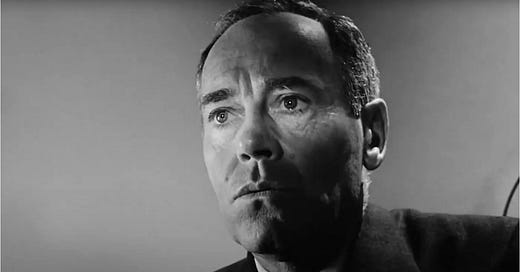‘Fail Safe’ At 60: The Pentagon Hated This Classic Suspense Drama About Nuclear Catastrophe
US military officials sabotaged this Cold War film, which suggested that the machinery of war was uncontrollable. Not even President Henry Fonda could save the world.
Within director Sidney Lumet’s film “Fail Safe” lies an idealism that challenges nuclear warfare and the folly of great power competition.
A catastrophic military accident forces the President, played by Henry Fonda, to acknowledge that the United States and the Soviet Union let the Cold War nuclear arms race get out of hand. The President declares, “What we put between us, we can remove.”
The film premiered at the New York Film Festival on September 15, 1964, and opened in the U.S. on October 7. It was based on a book by Eugene Burdick and Harvey Wheeler, which Walter Bernstein adapted for the screen. Bernstein was blacklisted in the 1950s and understood the fear and paranoia fueled by the Cold War quite well.
Pentagon officials despised the movie and sabotaged the production. “The incidents in ‘Fail Safe’ are deliberate lies!” cried General Curtis LeMay, a professed war criminal who firebombed Tokyo. “Nothing like that could happen.”
More well-known is the fact that director Stanley Kubrick did not want Lumet’s film to be released before “Dr. Strangelove or: How I Learned To Stop Worrying and Love the Bomb,” which was adapted from a book called “Red Alert.” Kubrick and the book’s authors filed a frivolous plagiarism lawsuit against the authors of “Fail-Safe” that resulted in a settlement.
Kubrick’s bitter act guaranteed that “Fail Safe” would forever exist in the shadow of his movie. As part of the settlement, Columbia Pictures took ownership of the “Fail Safe” film. Columbia also owned “Dr. Strangelove,” and the studio ensured that Kubrick’s nuclear war satire was released before “Fail Safe.”
Lumet recalled, “We opened to no audience whatsoever. You have to look silly after the comedy version has come out.”
“The two movies, ‘Strangelove’ and ‘Fail Safe,’ have everything in common in terms of storyline, and nothing in common in terms of character, intent, or style,” Lumet contended.
Indeed, in “Dr. Strangelove,” the characters are so stuck in their fear, paranoia, and jingoism that the audience is primed to laugh at them for sparking a doomsday event. But “Fail Safe” takes a different approach, presenting viewers with several characters who make a righteous and sincere effort to disentangle themselves from the war machine that may destroy the world.
Read the full article at Kevin Gosztola’s movie publication, The Wide Shot



